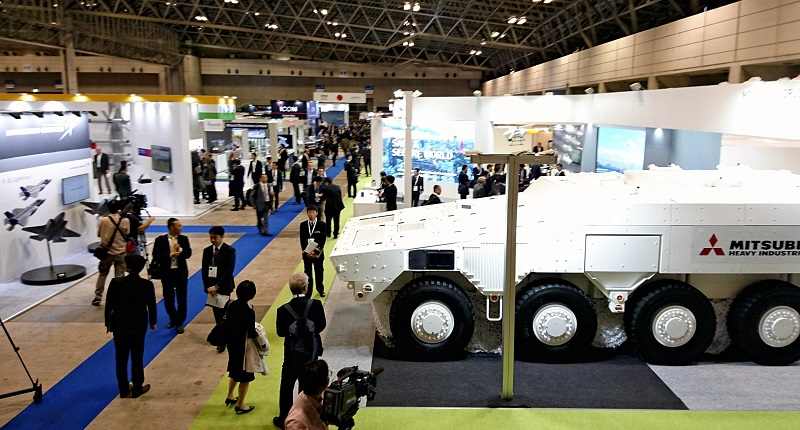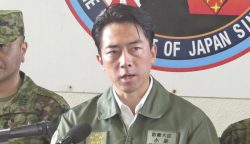
An international exhibition of defense equipment by Japanese and foreign manufacturers is held in Makuhari Messe in Chiba in 2019.
20:00 JST, September 25, 2022
To promote Japan’s defense industry, the government plans to take the lead in expanding exports of defense equipment such as aircraft and vehicles used by the Self-Defense Forces, according to governmental sources.
Under this policy, the government will be fully involved in all facets of negotiations with other countries regarding such orders and provide financial support to defense-related enterprises.
The government has begun looking into specifying the policy in the nation’s National Security Strategy, set to be revised by the end of this year.
At present, the export of Japanese defense equipment has been effectively left entirely up to private enterprises.
The National Security Strategy serves as a basis for the government’s diplomatic and security policies. The planned revision will be its first since its compilation in 2013.
Japan’s defense industry has been in decline partly because its customers have generally been limited to the Defense Ministry and the SDF. Since 2003, more than 100 companies have withdrawn from the defense sector.
To maintain combat capabilities in the event of a contingency, the existence of defense-related firms is essential.
The government thus wants to help expand sales channels to buyers other than the SDF, judging it necessary to strengthen the defense industry’s foundations.
Official permission is needed to export defense equipment or offer related technologies abroad, but negotiations to receive orders from potential recipient countries are mainly conducted by private companies in Japan.
There have been several cases where the Japanese side lost their bids to foreign firms that entered negotiations through cooperation between their nation’s public and private sectors.
The government plans to proactively engage from the beginning of such negotiations and aims to build a system whereby the public and private sectors will promote defense equipment to potential purchasers.
As for financial support to the private enterprises, the government will likely set up a system to subsidize costs if defense equipment needs to be improved or the specifications have to be altered to meet requests from purchasing nations.
After purchases are made, the government plans to have the SDF provide lessons and training in the use of the defense equipment, while the private enterprise involved offers continuous maintenance services.
In 2014, the government replaced a policy that effectively banned defense equipment exports with the Three Principles on Transfer of Defense Equipment and Technology, which permitted exports as long as the transfers were not to countries in armed conflicts; the range is limited to contributing to peace, promotion of international cooperation or other purposes contributing to Japan’s security; and the recipient countries’ appropriate management of the equipment can be ensured.
Despite the policy, there has been only one case where Japan exported a fully assembled product: an air defense radar system to the Philippines.
The operational guideline for the principles limits the usage of transferred defense equipment to rescue, transportation and surveillance, for example, so Japan cannot export destroyers or fighter jets. The government sees defense exports as consisting of equipment such as transport aircraft and noncombat vehicles, but these rules might be relaxed in the future.
According to a senior Defense Ministry official, when France approaches Southeast Asian countries to buy its fighter jets, the French government sweetens the deal with an offer to increase the number of direct passenger flights.
South Korea has rapidly expanded its defense sales channels by covering for some of the research and development costs to improve the weapons for transfer to other countries.
The U.S. government has increased exports of weapons under a foreign military sales program in which Washington provides assistance mainly to allies for the acquisition of military equipment made by U.S. companies. The United States also provides necessary training programs in the sales packages.
In April, the Japan Business Federation (Keidanren) asked the ministry to discuss establishing a Japanese version of the program.
Top Articles in Politics
-

Japan PM Takaichi’s Cabinet Resigns en Masse
-

Sanae Takaichi Elected Prime Minister of Japan; Keeps All Cabinet Appointees from Previous Term
-

Japan’s Govt to Submit Road Map for Growth Strategy in March, PM Takaichi to Announce in Upcoming Policy Speech
-

LDP Wins Historic Landslide Victory
-

LDP Wins Landslide Victory, Secures Single-party Majority; Ruling Coalition with JIP Poised to Secure Over 300 seats (UPDATE 1)
JN ACCESS RANKING
-

Japan PM Takaichi’s Cabinet Resigns en Masse
-

Japan Institute to Use Domestic Commercial Optical Lattice Clock to Set Japan Standard Time
-

Israeli Ambassador to Japan Speaks about Japan’s Role in the Reconstruction of Gaza
-

Man Infected with Measles Reportedly Dined at Restaurant in Tokyo Station
-

Videos Plagiarized, Reposted with False Subtitles Claiming ‘Ryukyu Belongs to China’; Anti-China False Information Also Posted in Japan





















